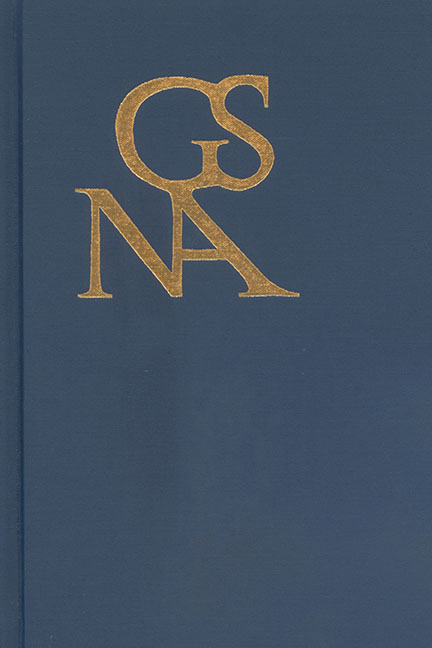Cultural Heritage Versus Legal Inheritance: Conflicting Views of Goethe’s Material Possessions, or Rereading His Personal Library
Published online by Cambridge University Press: 28 October 2020
Summary
IT WAS IN the mid-1800s that Goethe and Schiller were proclaimed Germany's “national” authors. Since then they have been co-opted as figureheads for the political values of virtually every German political state from the German Empire to the present day. This glorification comes at a cost, however, namely the authors’ “Musealisierung und Mortifizierung” (musealization and mortification), as Dieter Borchmeyer has called it. However, this process may, in fact, be an involuntary and almost inevitable side effect of being part of any “cultural heritage.” In this context, Goethe and Schiller stand for the “greatness” of German culture at large and have done so since at least since 1859, the centenary of Friedrich Schiller's birth. However, while the concepts typically associated with the German terms Kulturerbe and kulturelles Erbe (cultural heritage) have been in place since at least the mid-1800s and are now omnipresent, these specific German expressions only became common after 1945 and were likely adopted from the earlier French and English terms patrimoine and cultural heritage, respectively. This recent adoption of the terms Kulturerbe and kulturelles Erbe was likely due to international UN and UNESCO conventions. Moreover, the East German Erbediskussion (discussion of heritage) that postulated a strong continuity between the “humanist” values of Weimar classicism and the political and cultural policies of the GDR has likely contributed as well.
That does not mean, however, that associations between cultural artifacts and their creators, on the one hand, and national identity, on the other, are recent inventions. In fact, quite the opposite is true; so-called national authors have been considered vital elements of national identity since at least the 1800s (e.g., Alexander Pushkin for Russia, Adam Mickiewicz for Poland, and, more recently, Margaret Atwood for Canada) and have been intimately associated with the social construction of nations as “imagined communities” (Benedict Anderson) since the early 1800s. The idea that certain cultural artifacts are, at least metaphorically, owned by an entire population dates back to the French Revolution and this concept subsequently served to legitimize art thefts committed by the Napoleonic armies throughout Europe. As Bénédicte Savoy has shown, postrevolutionary France viewed itself as humankind's most progressive nation and (from this point of view) as entitled to gather the world's most important artworks in its museums, first and foremost the Louvre.
- Type
- Chapter
- Information
- Goethe Yearbook 27 , pp. 119 - 136Publisher: Boydell & BrewerPrint publication year: 2020



